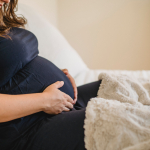The British Medical Journal recently published a brief, but comprehensive review of eating disorders in pregnancy by Veronica Bridget Ward. Eating disorders (anorexia nervosa, bulimia nervosa, and eating disorder not otherwise specified) most commonly occur in women of reproductive age and may be influenced by pregnancy and its associated weight gain and change in body shape. Some women experience a worsening of eating disorder symptoms, while others improve, or remain unchanged throughout the course of the pregnancy.
The literature regarding how eating disorders affect pregnancy and fetal outcomes is limited and conflicting. Several studies have shown that miscarriage rates are higher among women with histories of bulimia nervosa, and women with histories of anorexia nervosa are significantly more likely to give birth to smaller babies compared with the general population.
Other issues identified include the increased risk of maternal psychological distress and depression during pregnancy, and the increased risks of postpartum depression, and postpartum relapse of the eating disorder. One study indicated that women with active bulimic symptoms during pregnancy are three times more likely to experience postpartum depression than those with quiescent symptoms.
The mother-infant relationship may also be affected by the fact that women with eating disorders have been found to discontinue breastfeeding earlier. Women with disordered eating are also likely to be more critical and controlling of their children especially during meal times. Children of women with eating disorders are also more likely to weigh less than controls.
This review provides important guidelines for the management of pregnant women with eating disorders including:
- Treat the eating disorder before pregnancy
- Provide general nutritional advice before pregnancy
- Educate women about nutrition and growth of the fetus
- Refer the woman to an eating disorder service as early in pregnancy as possible if she has an active eating disorder
- Alert the obstetrician or midwife to the presence of an eating disorder
- Watch for postpartum depression after delivery and for recurrence or deterioration or eating disorder
- Support breast feeding
- Consult with the pediatrician to monitor infant growth and weight gain closely
April Hirschberg, MD
Blais MA, et al. Pregnancy: outcome and impact on symptomatology in a cohort of eating-disordered women. Int J Eat Disord 2000; 27:140-9.
Kouba S, et al. Pregnancy and neonatal outcomes in women with eating disorders. Obstet Gynecol 2005; 105:255-260.
FIND MORE ARTICLES about this topic in our Pregnancy Library.








Leave A Comment